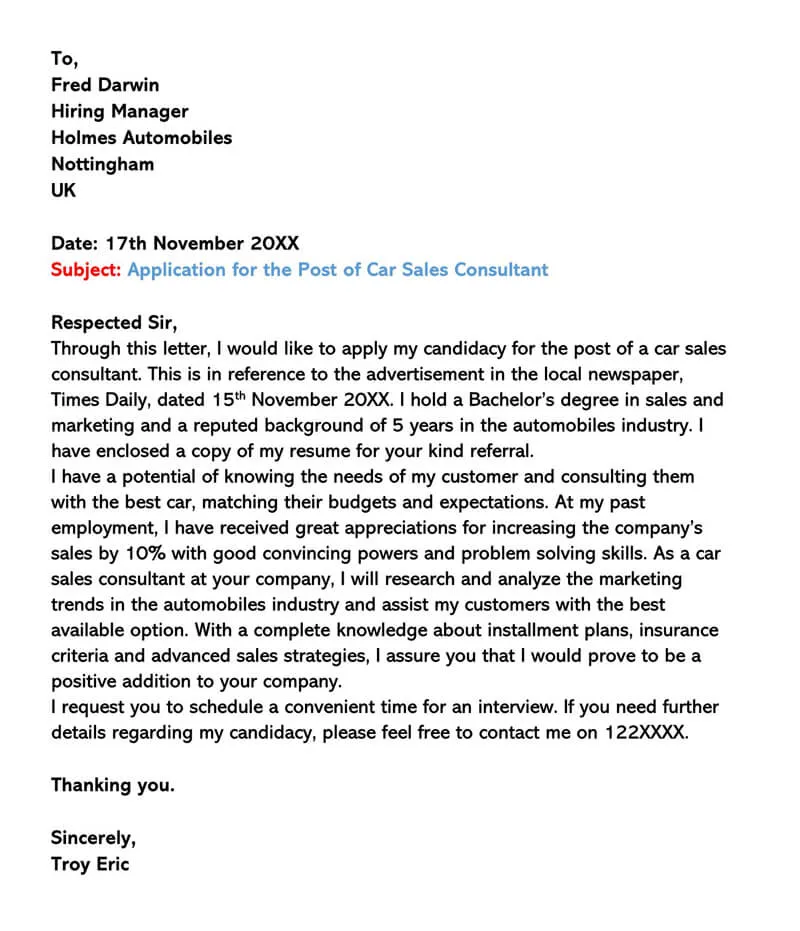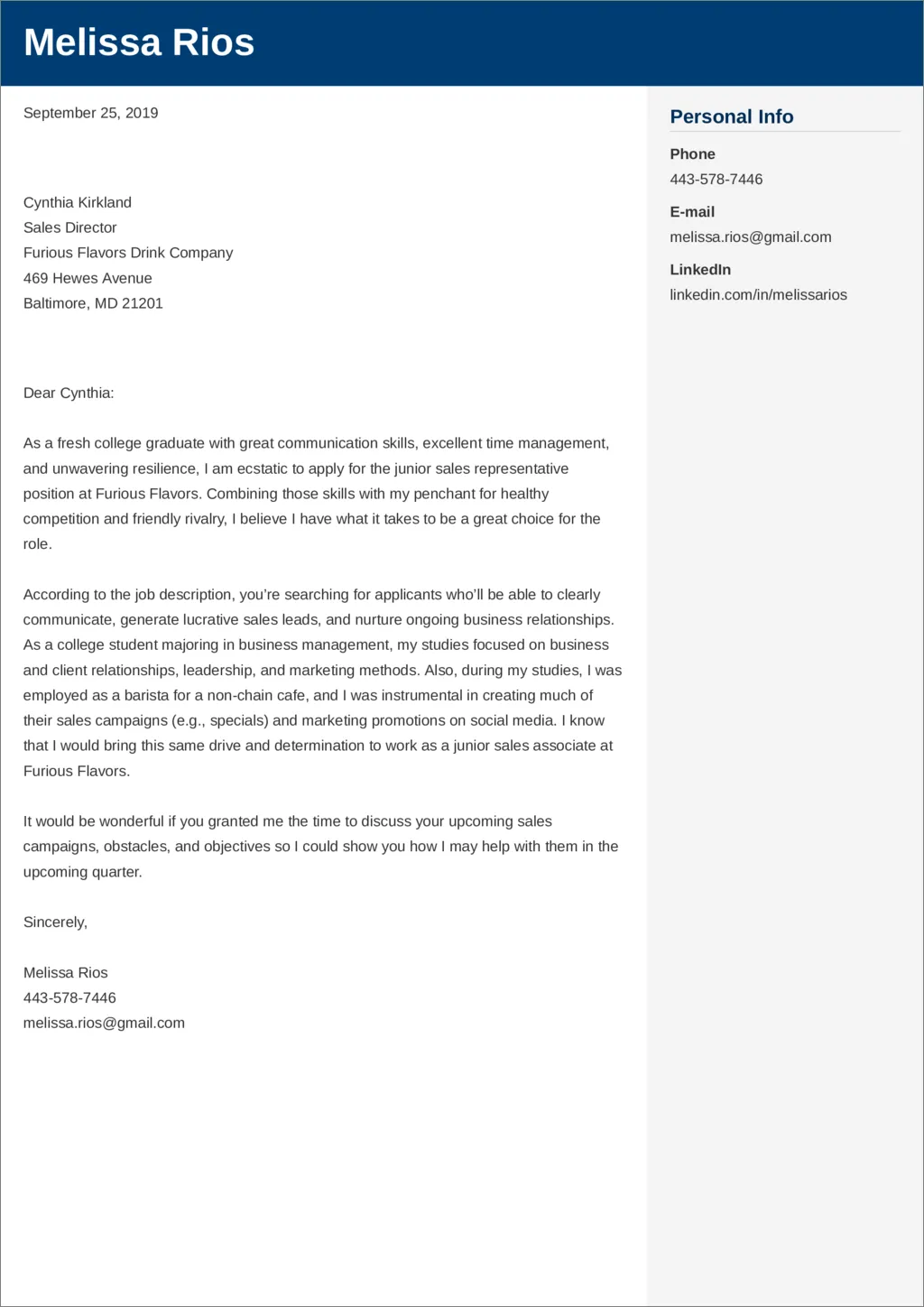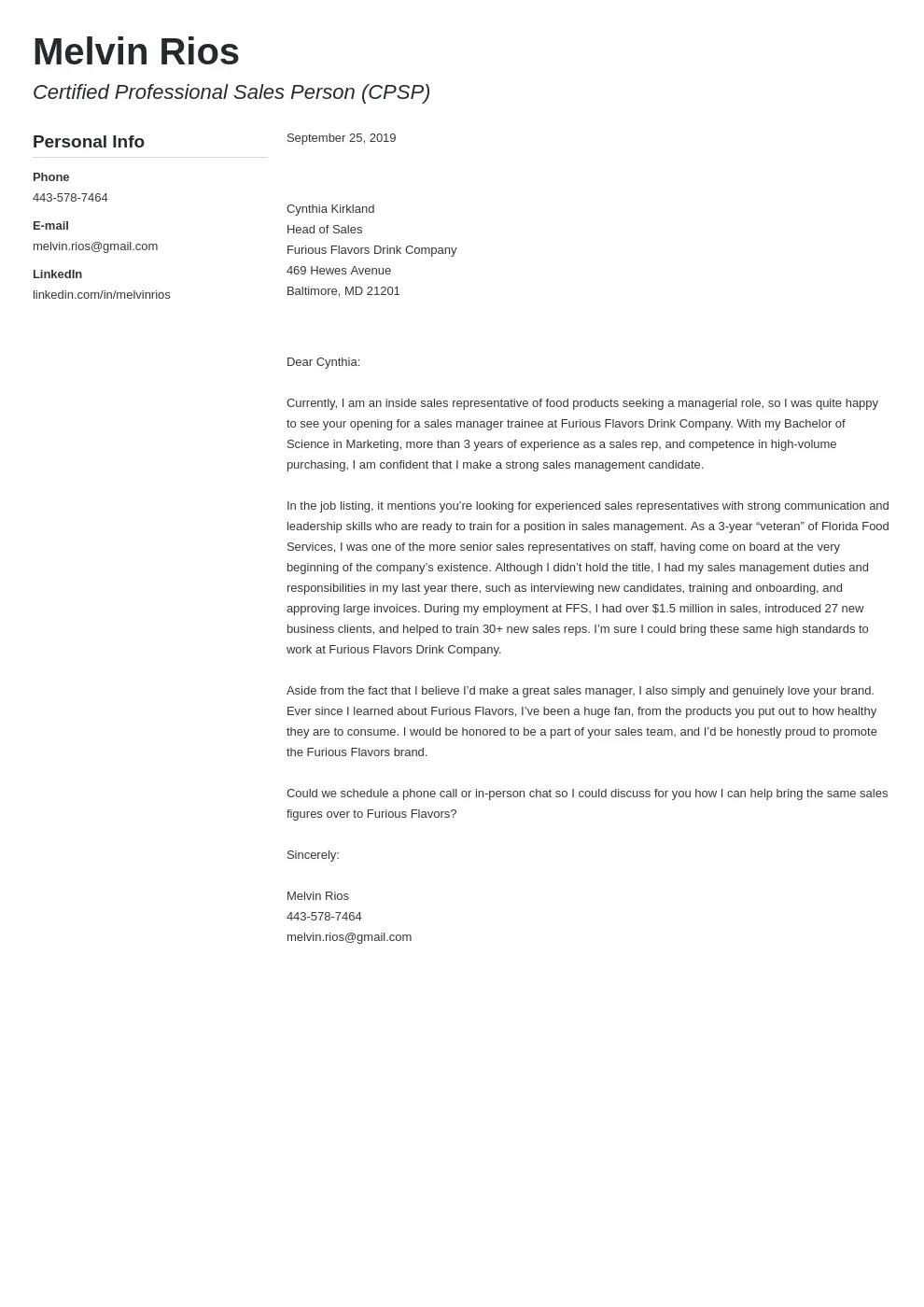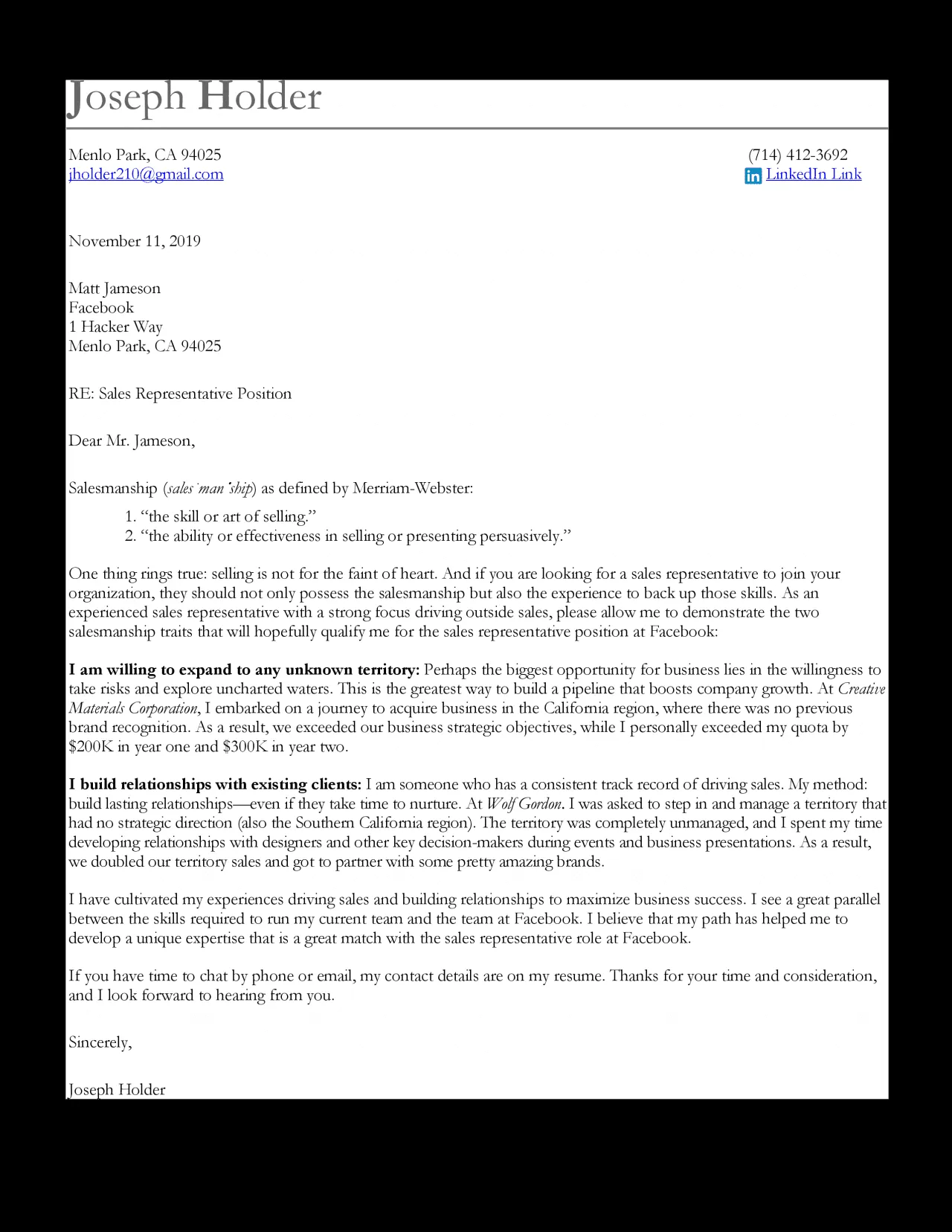Unveiling Sales Cover Letter Secrets
A compelling sales cover letter is your first introduction to a potential employer. It’s an opportunity to showcase your skills, experience, and enthusiasm for the role. Unlike a resume, which provides a chronological overview of your career, a cover letter allows you to tell a story, highlighting how your unique abilities align with the company’s needs and the specific job requirements. Writing an effective sales cover letter can be challenging, but by following some key secrets, you can significantly increase your chances of landing an interview and ultimately securing the job. This guide will provide the top 5 secrets to writing a cover letter that grabs the attention of the hiring manager and demonstrates your value as a sales professional.
Highlighting Your Achievements
One of the most crucial secrets to a successful sales cover letter is highlighting your achievements. Rather than simply listing your responsibilities, focus on what you have accomplished in previous roles. Provide concrete examples of how you exceeded sales targets, increased revenue, or improved customer satisfaction. This is where you differentiate yourself from other candidates. Use action verbs to describe your accomplishments and quantify your results whenever possible. For instance, instead of writing “Managed client accounts”, write “Successfully managed a portfolio of 50+ client accounts, resulting in a 20% increase in revenue within one year”. The goal is to demonstrate the value you brought to previous employers and how you can replicate that success in the new role. Always showcase what you have accomplished, this will get you noticed by the hiring manager.
Quantifying Your Success

Quantifying your success goes hand-in-hand with highlighting your achievements. Numbers speak volumes, and using them in your cover letter provides tangible evidence of your capabilities. Whenever possible, include specific figures, percentages, and dollar amounts to illustrate your impact. For example, state “Increased sales by 30% in Q4 of 2022”, or “Consistently exceeded sales quotas by an average of 15% per quarter”. Such quantifiable data not only backs up your claims but also provides the hiring manager with a clear understanding of your performance. This method is particularly effective in sales because it demonstrates your ability to deliver results and achieve targets. Use numbers in order to show hiring managers that you are a good candidate.
Tailoring to the Specific Role
A generic cover letter is easily recognized and often discarded. To make a lasting impression, you must tailor your cover letter to the specific role and company you are applying for. This involves carefully reading the job description and identifying the key skills and qualifications the employer is seeking. Then, highlight the experiences and achievements that directly align with those requirements. Moreover, demonstrate that you understand the company’s values, products, and target market. This shows the hiring manager that you are genuinely interested in the opportunity and have taken the time to research their organization. Customization is key to showing that you are the right fit for the job and that you have gone the extra mile.
Researching the Company
Before writing your cover letter, thoroughly research the company. Understand their mission, values, products, services, and target market. Visit their website, read industry news, and review their social media presence. The more you know about the company, the better you can tailor your letter to demonstrate your genuine interest and how your skills align with their goals. Show the hiring manager that you are not just applying for any job but are specifically drawn to their company and its mission. This research will not only inform the content of your cover letter but also help you craft a more compelling and personalized pitch. Understanding the company’s current challenges and opportunities can give you an edge by allowing you to highlight how you can contribute to their success.
Showcasing Relevant Skills

While highlighting achievements is important, your cover letter should also showcase your relevant skills. Sales positions require a blend of hard and soft skills. Identify the skills listed in the job description and provide examples of how you have used those skills in past roles. This could include communication, negotiation, problem-solving, and closing deals. Back up each skill with a specific example that demonstrates your proficiency. For example, if the job description emphasizes the need for excellent communication skills, describe a situation where you successfully communicated with a difficult client, resolved a conflict, and secured a sale. Your goal is to convince the hiring manager that you possess the skills necessary to excel in the position.
Communication and Interpersonal Skills
Sales professionals need strong communication and interpersonal skills. Your cover letter should demonstrate these abilities through your writing style and content. Use clear, concise language and a professional tone. Highlight your ability to build rapport, actively listen, and persuade others. Provide examples of how you have successfully used these skills to build relationships with clients, negotiate deals, or resolve conflicts. The way you write your cover letter will also showcase your communication skills. Ensure your writing is easy to understand, grammatically correct, and free of jargon or overly complex language. Your goal is to make a positive impression and showcase that you can communicate clearly and effectively both in writing and in person.
Structuring Your Letter
The structure of your cover letter is as important as its content. A well-structured cover letter is easy to read and conveys your message effectively. The letter should typically include an opening paragraph, a body (where you highlight your achievements and skills), and a closing paragraph. Each section should have a clear purpose and flow logically into the next. Use headings and bullet points to break up the text and make it easier to scan. The length of your cover letter should be concise, ideally no more than one page. A well-structured cover letter demonstrates your organizational skills and shows that you respect the hiring manager’s time.
Compelling Opening

The opening paragraph is your chance to grab the reader’s attention. Start with a compelling hook that highlights your enthusiasm for the role and the company. Clearly state the position you are applying for and briefly mention where you found the job posting. Immediately demonstrate your value by mentioning a key achievement or skill that aligns with the job requirements. Your opening should be concise, engaging, and set the tone for the rest of the letter. Avoid generic phrases like “I am writing to express my interest…” Instead, aim for an opening that creates immediate interest and makes the hiring manager want to read more. Show that you have done your research and that this is a good fit for you and the company.
Strong Closing
The closing paragraph is your final opportunity to leave a lasting impression. Reiterate your interest in the position and express your enthusiasm for the opportunity to contribute to the company’s success. Include a call to action, such as requesting an interview and providing your contact information. Thank the hiring manager for their time and consideration. Keep it brief and professional. Your closing should reinforce your value proposition and leave the hiring manager with a positive and confident impression of you. Avoid sounding desperate or overly eager. Instead, conclude with a statement that reflects confidence and professionalism.
Proofreading and Formatting
Attention to detail is critical, especially in sales. Proofreading and formatting your cover letter is a non-negotiable step. Errors in grammar, spelling, and punctuation can create a negative impression and undermine your credibility. Before submitting your cover letter, carefully proofread it multiple times. Use spell-check and grammar-check tools, but also read the letter aloud to catch any errors that automated tools might miss. Ensure the formatting is clean, professional, and consistent. Use a standard font and font size, and maintain consistent spacing. The layout of your cover letter reflects your professionalism and attention to detail. A well-formatted and error-free cover letter demonstrates that you take your application seriously and value the opportunity.
Ensuring Professionalism

Professionalism extends beyond just the words you write. Your cover letter should reflect a professional tone and style. Avoid using slang, jargon, or informal language. Use a formal salutation (e.g., “Dear Mr./Ms. [Last Name]”) and closing (e.g., “Sincerely”). Address the hiring manager by name if possible. The tone should be enthusiastic but not overly familiar or casual. Maintain a positive and confident tone throughout. Ensure your contact information is accurate and professional. The overall goal is to present yourself as a polished and reliable candidate who can be trusted to represent the company professionally.
Reviewing for Clarity
Clarity is crucial in a cover letter. The hiring manager should be able to quickly understand your key qualifications and why you are a good fit for the role. After writing your cover letter, review it to ensure your message is clear and concise. Eliminate any unnecessary words or phrases. Make sure each sentence conveys a clear point and contributes to your overall message. Ask a friend or colleague to read your letter and provide feedback on its clarity. A second pair of eyes can often identify areas where the language might be ambiguous or unclear. The goal is to make it easy for the hiring manager to understand your strengths and value.
In conclusion, writing a successful sales cover letter requires careful attention to detail, strategic planning, and a thorough understanding of what hiring managers seek. By highlighting your achievements, quantifying your success, tailoring your letter to the specific role, showcasing your relevant skills, and following the formatting and proofreading guidelines, you can significantly increase your chances of landing an interview and securing your dream sales job. Remember to always be professional and show the hiring manager that you’re the perfect candidate.
